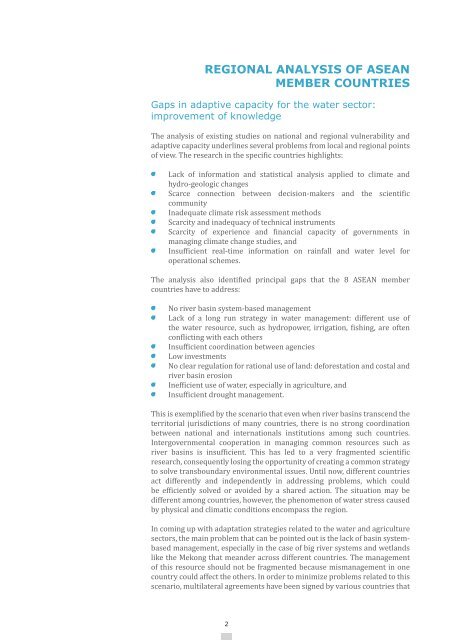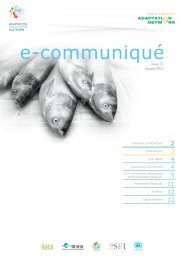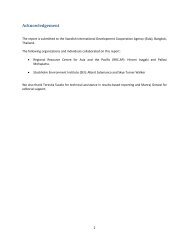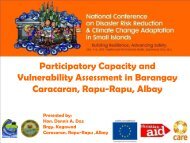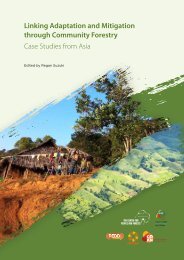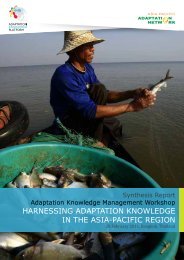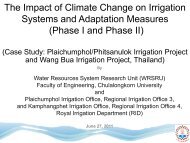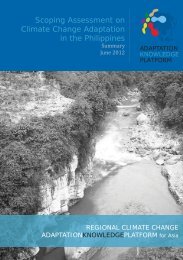Desktop Study on - Regional Climate Change Adaptation ...
Desktop Study on - Regional Climate Change Adaptation ...
Desktop Study on - Regional Climate Change Adaptation ...
Create successful ePaper yourself
Turn your PDF publications into a flip-book with our unique Google optimized e-Paper software.
REGIONAL ANALYSIS OF ASEAN<br />
MEMBER COUNTRIES<br />
Gaps in adaptive capacity for the water sector:<br />
improvement of knowledge<br />
The analysis of existing studies <strong>on</strong> nati<strong>on</strong>al and regi<strong>on</strong>al vulnerability and<br />
adaptive capacity underlines several problems from local and regi<strong>on</strong>al points<br />
of view. The research in the specific countries highlights:<br />
Lack of informati<strong>on</strong> and statistical analysis applied to climate and<br />
hydro-geologic changes<br />
Scarce c<strong>on</strong>necti<strong>on</strong> between decisi<strong>on</strong>-makers and the scientific<br />
community<br />
Inadequate climate risk assessment methods<br />
Scarcity and inadequacy of technical instruments<br />
Scarcity of experience and financial capacity of governments in<br />
managing climate change studies, and<br />
Insufficient real-time informati<strong>on</strong> <strong>on</strong> rainfall and water level for<br />
operati<strong>on</strong>al schemes.<br />
The analysis also identified principal gaps that the 8 ASEAN member<br />
countries have to address:<br />
No river basin system-based management<br />
Lack of a l<strong>on</strong>g run strategy in water management: different use of<br />
the water resource, such as hydropower, irrigati<strong>on</strong>, fishing, are often<br />
c<strong>on</strong>flicting with each others<br />
Insufficient coordinati<strong>on</strong> between agencies<br />
Low investments<br />
No clear regulati<strong>on</strong> for rati<strong>on</strong>al use of land: deforestati<strong>on</strong> and costal and<br />
river basin erosi<strong>on</strong><br />
Inefficient use of water, especially in agriculture, and<br />
Insufficient drought management.<br />
This is exemplified by the scenario that even when river basins transcend the<br />
territorial jurisdicti<strong>on</strong>s of many countries, there is no str<strong>on</strong>g coordinati<strong>on</strong><br />
between nati<strong>on</strong>al and internati<strong>on</strong>als instituti<strong>on</strong>s am<strong>on</strong>g such countries.<br />
Intergovernmental cooperati<strong>on</strong> in managing comm<strong>on</strong> resources such as<br />
river basins is insufficient. This has led to a very fragmented scientific<br />
research, c<strong>on</strong>sequently losing the opportunity of creating a comm<strong>on</strong> strategy<br />
to solve transboundary envir<strong>on</strong>mental issues. Until now, different countries<br />
act differently and independently in addressing problems, which could<br />
be efficiently solved or avoided by a shared acti<strong>on</strong>. The situati<strong>on</strong> may be<br />
different am<strong>on</strong>g countries, however, the phenomen<strong>on</strong> of water stress caused<br />
by physical and climatic c<strong>on</strong>diti<strong>on</strong>s encompass the regi<strong>on</strong>.<br />
In coming up with adaptati<strong>on</strong> strategies related to the water and agriculture<br />
sectors, the main problem that can be pointed out is the lack of basin systembased<br />
management, especially in the case of big river systems and wetlands<br />
like the Mek<strong>on</strong>g that meander across different countries. The management<br />
of this resource should not be fragmented because mismanagement in <strong>on</strong>e<br />
country could affect the others. In order to minimize problems related to this<br />
scenario, multilateral agreements have been signed by various countries that<br />
2


